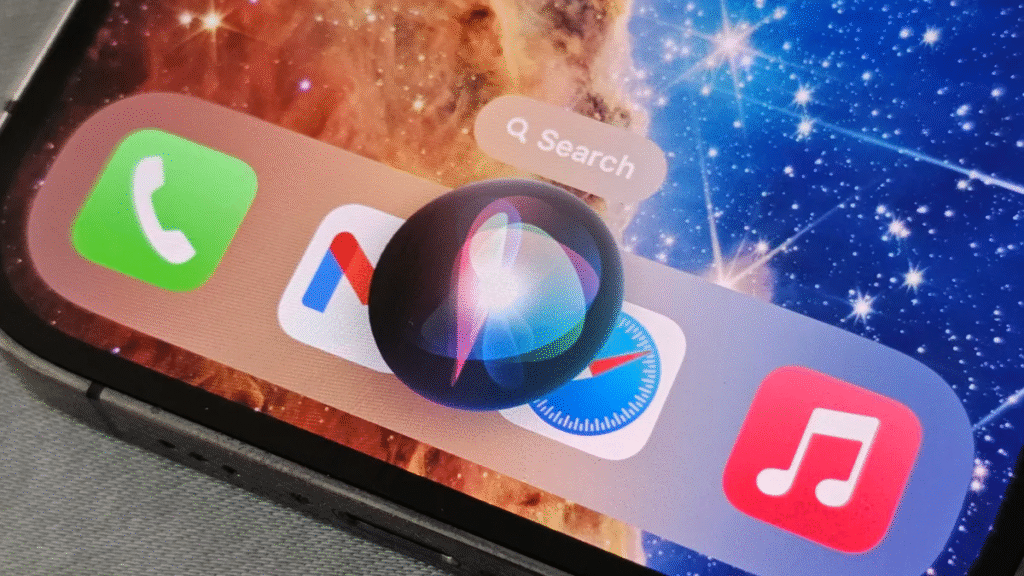Cupertino, CA — June 9, 2025 — As Apple Inc. prepares to take center stage at its annual Worldwide Developers Conference (WWDC 2025), investor concerns are mounting over one of the company’s long-standing pillars: Siri, its digital assistant. Despite years of development, Siri continues to lag behind in the Artificial Intelligence race, especially as competitors like OpenAI’s ChatGPT, Google’s Gemini, and Amazon’s Alexa GenAI redefine consumer expectations.
The buzz around the WWDC 2025 event has centered on Apple’s anticipated “major AI overhaul” and the rollout of iOS 26. But for industry observers and shareholders alike, the focus is increasingly shifting toward how Apple plans to reposition Siri in a world that now demands fluid, generative, multi-modal AI experiences.
The Origin and Evolution of Siri: From Innovator to Underdog
Launched in 2011 as a marquee feature of the iPhone 4S, Siri was among the first digital voice assistants to gain global traction. Acquired by Apple in 2010 from a small SRI International spinout, Siri started strong, wowing users with basic voice commands, calendaring features, and contextual understanding.
But while Siri was once ahead of its time, Apple’s tight ecosystem, rigid privacy frameworks, and cautious pace of AI adoption slowed its evolution. Over the years, rivals leaped ahead — layering machine learning, neural networks, and now, generative models — while Siri remained confined to rule-based logic and limited memory.
The Current Landscape: Where Siri Falls Short
In 2025, AI assistants are no longer limited to basic commands. ChatGPT-powered tools write code, generate images, tutor students, and manage workflows. Google’s Gemini integrates seamlessly with Android and Workspace, handling real-time document editing and long-context queries. Meanwhile, Amazon has embedded conversational GenAI into Alexa for personalized shopping, home automation, and child-safe interaction.
Siri, by comparison, is often criticized for:
- Inconsistent Accuracy: Siri frequently misinterprets context or produces irrelevant results, particularly in open-ended tasks.
- Limited Memory: Unlike modern AI agents, Siri cannot carry context across sessions, making multi-turn conversations difficult.
- Restricted Developer Access: Apple’s tight control over SiriKit limits integration with third-party apps and services.
- Lack of Creativity: Siri lacks generative capabilities, making it obsolete for users accustomed to AI tools that create content, summarize information, or learn from behavior.
These limitations have grown more conspicuous in an era dominated by LLMs (large language models), which support adaptive learning, personalization, and even multimodal interaction across voice, text, and images.
Explore more AI/Tech news on TechThrilled
Investor Sentiment: A Growing Unease
The underwhelming performance of Siri has not gone unnoticed by investors. With Apple’s stock historically buoyed by its innovation narrative, concerns about stagnation in AI could weigh on confidence. In recent months, tech analysts and institutional investors have pressed for clearer insight into Apple’s AI roadmap — and whether Siri can realistically remain a central part of that vision.
This anxiety was reflected in a series of analyst downgrades issued just ahead of WWDC. Notably, some cited Apple’s “lagging presence in generative AI” as a risk factor, particularly in light of competition from Meta, Microsoft, and Google — all of which have made substantial moves into AI infrastructure, AI tools, and consumer-facing AI agents.
For comparison:
- Microsoft has deeply integrated Copilot into Windows and Office.
- Google has tied Gemini into Chrome, Android, and Gmail.
- Meta is reportedly planning AI agents across its apps and investing billions into partnerships like the one rumored with Scale AI.
In this context, Apple’s reliance on Siri as its AI front is increasingly viewed as a strategic liability — unless WWDC delivers a compelling upgrade.
Apple’s Upcoming Response: What We Know
Apple has been characteristically silent about the specifics of its WWDC announcements, but industry leaks and credible reports point to several possible developments:
1. Siri Overhaul Powered by Apple’s In-House LLMs
Sources suggest Apple has been quietly training a series of large language models under the project codename “Ajax.” These models are expected to be baked into iOS 26, potentially giving Siri contextual memory, broader command understanding, and generative capabilities — bringing it closer to the performance tier of ChatGPT or Gemini.
2. Privacy-Centric AI
Apple is likely to pitch its AI approach as fundamentally different from cloud-dependent competitors. Rumors indicate a “hybrid model” in which basic LLM inference occurs on-device while more advanced queries are routed to Apple’s secure cloud — aligning with its long-standing commitment to cybersecurity and user privacy.
3. Third-Party App Integration
Another expected reveal is an expanded SiriKit allowing developers to tap into the upgraded Siri stack. This would be a reversal of Apple’s traditionally locked-down approach and a necessary move to remain relevant in a rapidly evolving WebDev and mobile ecosystem.
4. Multimodal Interaction
Early concept demos leaked to industry insiders suggest Siri may soon accept and interpret input across text, images, voice, and possibly camera feeds — a direct shot at OpenAI’s GPT-4o and Google’s Gemini 1.5.
The Competitive Context: Siri vs. the World

The digital assistant space has transformed from scripted response bots to intelligent, ever-learning agents. Here’s how Siri stacks up against competitors:
| Feature | Siri (Current) | ChatGPT-4o | Gemini 1.5 | Alexa GenAI |
| Contextual Memory | No | Yes | Yes | Yes |
| Multimodal Input | Limited | Full | Full | Partial |
| Third-Party Integrations | Limited | Expanding | Extensive | Mature |
| On-Device AI | Partial | Cloud-only | Hybrid | Cloud-based |
| Code/Content Creation | No | Yes | Yes | Limited |
As the table makes clear, Siri’s current capabilities fall short in areas where AI innovation is moving fastest. The pressure to close this gap — and fast — is now existential.
Read more about the evolution of AI at TechThrilled
Future Outlook: Can Siri Catch Up?
Apple’s track record suggests it does not rush innovation, but it often excels in polishing and scaling proven ideas. Think of the iPhone, iPad, or Apple Watch — none were the first of their kind, but each redefined its category. If Apple applies this strategy to Siri, the assistant may yet see a renaissance.
However, the challenges are formidable:
- Reputation Risk: Siri’s past underperformance has led to user apathy. A rebrand or major feature set overhaul may be required.
- Data Acquisition: Generative AI thrives on data — an area where Apple is cautious due to its privacy stance. This creates tension between innovation and philosophy.
- Developer Incentives: Apple must entice developers to re-engage with Siri, offering APIs, SDKs, and monetization pathways to spark adoption.
Yet, the opportunity is massive. With more than 2 billion active Apple devices in use, a powerful AI agent integrated natively could instantly become the world’s most-used assistant — if Apple gets it right.
Broader Industry Implications
The success or failure of Apple’s AI strategy will shape the broader tech ecosystem in several ways:
1. Investor Dynamics
A successful Siri relaunch could fuel stock surges and renew long-term bullishness on Apple’s innovation cycle. Conversely, another incremental update could reinforce perceptions that Apple is losing the generative AI race.
2. AI Ethics and Privacy Standards
If Apple succeeds in implementing strong AI capabilities within its privacy-first model, it could set a new industry standard — challenging the data-hungry strategies of its rivals.
3. Mobile Ecosystem Shifts
The dominance of AI-native interfaces may shift the balance of power from apps to agents. A reimagined Siri would have ripple effects across app development, tokenomics of attention, and the future of UI design.
Final Thought: A Make-or-Break Moment for Siri
Siri’s journey from innovation to irrelevance reflects a decade of change in how humans interact with machines. As generative AI becomes the new user interface of the digital world, assistants must evolve from passive responders to proactive partners.
WWDC 2025 may prove to be a turning point not only for Siri, but for Apple’s place in the modern AI era. Investors, developers, and users alike are watching closely. If Apple delivers, Siri may once again become the benchmark of what intelligent, useful, and private digital assistance should look like.
For continuing coverage on Apple’s announcements and the AI evolution, visit TechThrilled’s homepage.
